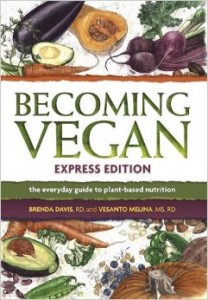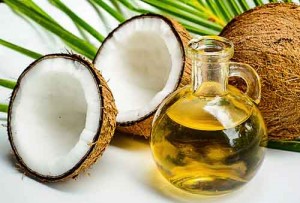 If you are Vegan or have ever researched being so, you will know well the breadth and depth of influence Brenda Davis and Vesanto Melina have had on nutrition, health, and Veganism. I am honored to share a section of their brand new book, Becoming Vegan Express Edition. This guest post is on a topic many people ask about often…and this is a detailed, evidence-based response to the question about whether coconut oil is healthful or harmful….
If you are Vegan or have ever researched being so, you will know well the breadth and depth of influence Brenda Davis and Vesanto Melina have had on nutrition, health, and Veganism. I am honored to share a section of their brand new book, Becoming Vegan Express Edition. This guest post is on a topic many people ask about often…and this is a detailed, evidence-based response to the question about whether coconut oil is healthful or harmful….
*See below for details on how to win a FREE copy of this brand new book…
 Few foods have been at once as maligned and acclaimed as coconut oil. Because it’s the most concentrated source of saturated fat in the food supply—even higher than lard or butter—some view it as a notorious health villain. Not surprisingly, it rests atop the “avoid” column of mainstream healthy-heart-food lists.
Few foods have been at once as maligned and acclaimed as coconut oil. Because it’s the most concentrated source of saturated fat in the food supply—even higher than lard or butter—some view it as a notorious health villain. Not surprisingly, it rests atop the “avoid” column of mainstream healthy-heart-food lists.
Others view coconut oil as a fountain of youth and the greatest health discovery in decades. These advocates claim that coconut oil can provide therapeutic benefits for Alzheimer’s disease, dementia, cancer, diabetes, digestive disturbances, heart disease, high blood pressure, HIV, kidney disease, osteoporosis, overweight, Parkinson’s disease, and many other serious conditions. So what’s the truth?
Based on the available science, coconut oil is neither a menace nor a miracle food. Coconut oil should be regarded like any other oil: a concentrated food that provides a lot of calories with limited nutrients. It’s okay to use some high-quality coconut oil when preparing special-occasion treats, but as with other oils, its use should be minimized. On the other hand, whole coconut should be treated in much the same way as other high-fat plant foods—enjoyed primarily as a whole food. As such, it’s loaded with fiber, vitamin E, and healthful phytochemicals, and has powerful antimicrobial properties.
The relative health effects of coconut oil consumption remain somewhat uncertain. Some people believe that eating coconut oil does no harm because it’s cholesterol-free; others claim it’s harmful because it lacks essential fatty acids. But we can’t ignore the fact that in many parts of the world where coconut and coconut oil are the principal sources of dietary fat, the rates of chronic disease, including CAD, are low. There is one major caveat: the benefits seem to apply only when coconut products are consumed as part of a diet rich in high-fiber plant foods and lacking processed foods.
The people of the Marshall Islands provide a poignant example. The traditional Marshallese diet employed a wide variety of coconut products, which furnished an estimated 50 to 60 percent of total calories. Seventy years ago, when this diet was standard fare, diabetes was pretty much unheard of. When their indigenous diet gave way to a Western-style diet of processed foods and fatty animal products, diabetes rates escalated even though coconut products continued to be featured prominently in the diet.
Coconut oil is so often blacklisted by health-care providers mainly because approximately 87 percent of its fat is saturated. Many people imagine saturated fat as a single tyrant that clogs arteries, but different types of saturated fats exist. They contain fatty acid chains whose lengths contain from 4 to 30 carbon atoms. Depending on the length of the carbon chain, these fatty acids have very different effects on blood cholesterol levels and on health.
The most common saturated fatty acids are lauric acid, myristic acid, palmitic acid, and stearic acid. Their carbon-chain length and main food sources are:
- lauric acid (12 carbon atoms): coconut, coconut oil, palm kernel oil
- myristic acid (14 carbon atoms): dairy products, coconut, palm oil, palm kernel oil, nutmeg oil
- palmitic acid (16 carbon atoms): palm oil, animal fats
- stearic acid (18 carbon atoms): cocoa butter, mutton fat, beef fat, lard, butter
Saturated fatty acids with 12 to 16 carbon atoms increase LDL cholesterol levels, while 18-carbon stearic acid doesn’t. However, stearic acid isn’t completely off the hook; some evidence shows high intakes could adversely affect other CVD risk factors, such as lipoprotein(a) and certain clotting factors.
As it happens, approximately three-quarters of the fat in coconut oil comprises saturated fatty acids known to raise blood cholesterol levels: 15 percent is saturated fatty acids with small carbon chains (6 to 10 carbon atoms), 47 percent is lauric acid, 18 percent is myristic acid, 9 percent is palmitic acid, and 3 percent is stearic acid. Case closed?
Well, not exactly. The predominant fatty acid, lauric acid, does raise total cholesterol, but it appears to raise HDL cholesterol to an even greater extent than LDL cholesterol, favorably altering the ratio of HDL to total cholesterol. In addition, lauric acid is converted in the body into monolaurin, a powerful antiviral, antifungal, and antiseptic compound—and coconut oil is among the richest food sources of lauric acid. There’s also evidence that coconut products have anti-inflammatory and antioxidant activity. However, the compounds responsible (which include a variety of phytochemicals, such as phenolic acids) are largely eliminated when coconut oil is refined.
 Brenda Davis is a leader in her field, an esteemed speaker, a member of the Vegetarian Hall of Fame, and a past chairperson of the Vegetarian Nutrition Dietetic Practice Group of the Academy of Nutrition and Dietetics (formerly the American Dietetic Association). She lives in Kelowna, British Columbia, with her husband, Paul.
Brenda Davis is a leader in her field, an esteemed speaker, a member of the Vegetarian Hall of Fame, and a past chairperson of the Vegetarian Nutrition Dietetic Practice Group of the Academy of Nutrition and Dietetics (formerly the American Dietetic Association). She lives in Kelowna, British Columbia, with her husband, Paul.
 Vesanto Melina is a sought-after speaker and consultant; she has taught nutrition at the University of British Columbia and Bastyr University in Seattle and is consultant to the government of B. C. She coauthored the joint position paper on vegetarian diets for the American Dietetic Association and Dietitians of Canada. She lives in Langley, BC with her partner Cam Doré.
Vesanto Melina is a sought-after speaker and consultant; she has taught nutrition at the University of British Columbia and Bastyr University in Seattle and is consultant to the government of B. C. She coauthored the joint position paper on vegetarian diets for the American Dietetic Association and Dietitians of Canada. She lives in Langley, BC with her partner Cam Doré.
They are the coauthors of 13 books, 6 jointly.
These books include their popular Becoming Raw, The New Becoming Vegetarian, Becoming Vegetarian, Becoming Vegan, and The Raw Food Revolution Diet. Brenda also is co-author of Defeating Diabetes and of Dairy-Free and Delicious. Vesanto is co-author of Cooking Vegan, Cooking Vegetarian, Raising Vegetarian Children, Food Allergies: Health and Healing, and the Food Allergy Survival Guide. Their books have been translated into 9 languages and have sold over 650,000 copies.
***Enter here to win a free copy of Becoming Vegan Express Edition: a Rafflecopter giveaway




This Post Has 41 Comments
I see so much about coconut oil, especially from the Paleo camps. Thanks for clearing up the confusion!
Thanks for discussing this!
I know a lot of people who rave about coconut oil for diet, but I was always on the fence because it is an oil. I do use it, but mostly as a body lotion, rather than in cooking.
Thank you for sharing such a scientific, rational understanding of the benefits of coconut oil. So many confusing voices in the market place in regard to nutrition.
I purchased a bottle of coconut oil and used it in a baking recipe. My preference is to use it as a face cream.
I use to be a coconut oil freak. . After my biology course fundamental s of nutrition. .I changed my tune… the industry has fooled us once again. ..
I still don't believe in using coconut oil or any kind of oil. Whole foods only!
Thanks, Julieanna! I don't use coconut oil much but I do know that it tastes amazing. Sometimes I just like to open the jar and inhale. 🙂
I use it for my skin and hair, but also on occasion for recipes that require high heat.
Ha! Bonnie, that's so funny! I do the same thing and I love it as lip gloss!
Me too, Angela! It smells so good!
Fascinating! Yes, it is too easy to get sucked into brilliant marketing!
Thank you for posting this excerpt! It is amazing to me how many people think coconut oil is like magic. I prefer to think of it in the same way as noted above – in whole food form, a small amount can be good. But in processed form, it's a fat and its use should be minimized in the diet.
Thanks for the information!
I like coconut oil for homemade salt and sugar scrubs and as a moisturizer. However, I have high cholesterol (hereditary) so I stay away from ALL saturated fats as much as possible!
Thank you so much for this information. It is truly difficult to get accurate information and to know if truth and what is hype.
Dammit
Then again, could it be so good for our health that scientists are paid to prove it's we shouldn't consume it?? I wouldn't be surprised.
I used to eat a lot of coconut oil, until I read Dr. Esselstyn's book about all oils and Jeff Novick, MS, RD's write-up about the nutritional value (empty) of coconut oil. Now I use coconut oil only on my body and on my chocolate Lab Zuzi's coat 🙂 I eat coconut flakes or fresh coconut instead (and in moderation). This was a great article with many good details!
I use coconut oil as shaving cream; it works great. I kept a small jar of it in my shower but moisture got in the jar and mold was growing over the coconut oil. Make sure that you keep the coconut away from moisture.
I have used coconut oil in baking and it smells and tastes fantastic; however, I do find it makes baked goods very, very oily so I try to use it sparingly.
i use it as moisturizer for my skin and hair. I have started to incorporate it more in cooking as well
coconut oil rocks =)
Personally I have found coconut oil to be very useful. But not all coconut oil is created equal. I find raw, cold-pressed coconut oil. Once it is processed it's benefits are reduced. I also use it in many ways. The best coconut oil I use for raw treats, baking/cooking, etc. I also oil pull with it, condition my hair, moisturize my skin, and it helps as a deodorant. I love it's antibacterial properties!
We use Coconut oil mostly in baking when the recipe specifically calls for… but otherwise I tend to use oils that aren't as high in saturated fat.
I use it for sooo many things. It is amazing stuff.
I've been wondering about the recent obsession with all things coconut oil. This is good info! Thanks!
very interesting.. coconut oil is one of those things you hear so many sides about
I love using coconut oil on my skin – leaves it so soft! 🙂
who do I find the real coconut oil ? does it has to be organic or just 100% ?
I use coconut oil very sparingly for cooking and liberally for my skin and hair.
I find it a little disturbing that you do not differentiate between the different types of coconut oil in the article. There is a significant difference between refined coconut oil and for example raw cold-pressed extra virgin (and organic) coconut oil.
Chemistry wise it is built like any other sat fat in organic nature…so its biochemistry is same. It will react the same in our body.
http://nutritionfacts.org/2013/07/30/is-coconut-oil-good-for-you/
My main use for coconut oil is for sauteing. It has a high smoke point and thus healthier than olive oil for that. I also use it as a moisturizer. I always want to use products on my skin that I wouldn't be afraid of eating since the skin absorbs the same as digesting.
Plant-Based Dietitian Hi,It wonderful tasting but try not to very often because I'm still not sure about all the fat BUT I use it every day on my skin.It's amazing on the skin and It's way better then any lotion or skin cream I've ever used. For me anyway
Same with me. skin and hair every day but I try to eat no more then 1 time a week
Everything in moderation! I treat coconut oil like the highly saturated fat that it is — minimal use at home, however not into nit-picking about vegan baked goods elsewhere (minimal purchase of those, though, just in case). We try to eat as little oil as possible, and when we do at home, it's always olive or canola.
I use coconut oil A LOT… For my hair! It's amazing… But I never really trusted it much in the kitchen.
Thankyou very much for providing this information keep sharing in future also
Thanks for sharing your valuable feed back keep sharing in future also